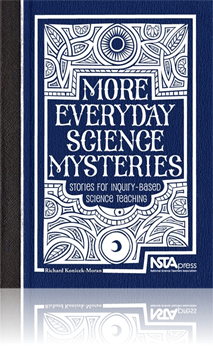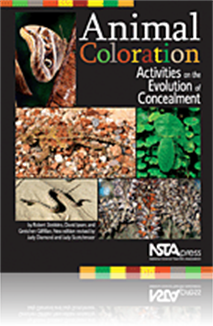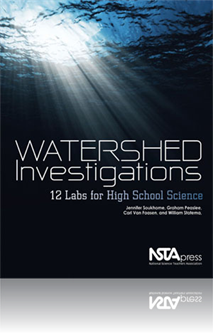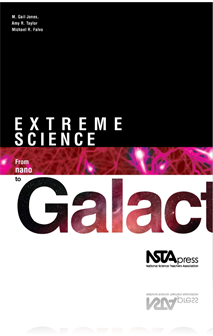All Resources
Book Chapter
Hardly a day goes by without something arriving by e-mail or being posted on the internet that just doesn’t sound true. The students in this story are depicted as having alert skepticism about things that don’t actually add up in their minds and ...
Book Chapter
Magnetism is a force that acts over a distance. Children play with magnetic toys all of the time. Any family that has a refrigerator knows that the number of magnets on the door defines the size of the appliance. This story should give students an op...
Book Chapter
This story should give students an opportunity to discover that every liquid has its own unique boiling point and that heat applied to any liquid that has reached its boiling point will not result in an increase in temperature but will be used to cha...
Book Chapter
Dissolving things in the universal solvent water is an everyday experience for almost all of us. We don’t have a lot of trouble dissolving honey in hot tea, but when it comes to sweetening cold iced tea, it is almost impossible. Obviously, water is...
Book Chapter
This story poses a challenge to solve the mystery of light, color, and how we see color. It also asks the question, “What is color?” After investigating the phenomena of color and color filters, students should realize that light is made up of ma...
Book Chapter
This story is designed to motivate students to explore how mirrors work and how mirrors reflect the light—first reflected from objects to the mirror and then to our eyes as images—and to discover in this particular case the famed rule that “the...
Book Chapter
Using the Book and the Stories
It is often difficult for overburdened teachers to develop lessons or activities that are compatible with the everyday life experiences of their students. A major premise of this book is that if students can see the real-life implications of science ...
Book Chapter
Using the Book in Different Ways
Although the book was originally designed for use with K–8 students by teachers or adults in informal settings, it became obvious that a book containing stories and content material for teachers who are intent on teaching in an inquiry mode had oth...
Book Chapter
The Link Between Science, Inquiry, and Language Literacy
There is currently a strong effort to combine science and literacy, because a growing body of research stresses the importance of language in learning science. Discussion, argumentation, discourse of all kinds, group consensus, and social interaction...
Book Chapter
What’s Hiding in the Woodpile?
Wood comes from trees, right? It is full of potential chemical energy that can produce heat when it is put into a stove or fireplace and burned. Yet, in this story, the Earth’s bounty seems to produce a cooler room. What can be the cause? Thermodyn...
Book Chapter
This story is based upon using solar energy and a variety of materials to modify and channel this energy to capture and hold heat. Almost everybody has experienced the differences in temperature due to sunshine passing through windows into an enclose...
Book Chapter
In 1991 and 1992, John Leach, Bonnie Shapiro, and the author did a study in which they interviewed approximately 400 students from the United Kingdom, Canada, and the United States about their beliefs surrounding the decay of an apple over a year’s...
Book Chapter
This story obviously is aimed at the technology standards. Two simple timing devices are mentioned with the suggestion that more are possible. These can be improved to meet the challenge or other devices could be invented. Students are being challeng...
Book Chapter
The two concepts at work here are conservation of matter and the question about many surfaces vs. fewer surfaces absorbing heat. You may wonder what this story is doing in the Earth system science area, but it has to do not only with thermodynamics a...
Book Chapter
Most animals are patterned. While some markings may serve as an advertisement, many appear to function in concealment. Because of the principal way in which they seem to function, such markings are often termed disruptive coloration. Although there a...
Book Chapter
Modeling Glacial Features With Sand
In this investigation, students make a model of the different erosional features of valley and continental glaciers out of sand and determine their impact on topography and hydrology. ...
Book Chapter
Aquatic Macroinvertebrate Identification
Everyone is familiar with terrestrial insects such as dragonflies, houseflies, mosquitoes, and beetles, but many of us are unaware that several insects live in the water during their larval stages. These insects are part of a larger group of organism...
Book Chapter
Factors That Affect Eutrophication
In this investigation, the effects of excess nutrients (nitrate and phosphate) on algae will be examined. An excess of these nutrients can lead to eutrophication in ponds and lakes. Eutrophic lakes typically are shallow, have mucky bottoms, and have ...
Book Chapter
This investigation consists of two parts, in which students first model the effects of groundwater contamination and then track the flow of the contamination. However, Part I does not have to be done in order to do Part II. This Teacher Information s...
Book Chapter
Glacial Features of a Watershed
The objective of this investigation is for students to learn how glaciers shaped a watershed. ...
Book Chapter
This investigation gives students the opportunity to view the outside world and bring science into the field. Teaching students how to identify plants gives them a greater appreciation for nature, just as learning to read words lets young students be...
Book Chapter
Learning how to delineate a wetland using official criteria can be an enlightening experience for students and teachers. The objective of this investigation is for students to delineate the boundaries of an area in a watershed and categorize it as a ...
Book Chapter
In this investigation, students will select, identify, and test a common plant for allelopathy by extracting the plant’s natural chemicals and measuring the effect on the germination of lettuce seeds. They will analyze the data statistically to det...
Book Chapter
When humans change the natural topography, certain effects are likely to be seen in a watershed. The transportation of water and sediment increases when streams are straightened and, with the increased flow rate of water, erosion also increases. All ...
Book Chapter
Streamflow, or discharge, is defined by the U.S. Geological Survey (USGS) as the volume of water flowing past a fixed point in a fixed unit of time. The discharge of a stream can be affected by many things, including topography and channel morphology...
Book Chapter
Flood Frequency Analysis for a River
In many watersheds, the frequency of flooding has greatly increased in the past 20 years, mainly due to changes in the hydrology as a result of farming and urbanization. Human habitation of floodplains causes floods to be perceived as destructive, bu...
Book Chapter
Comparison of Phosphate Levels in Stream Sediments
Phosphorus is an important nutrient to all life. Unfortunately, when phosphate reaches the soil it is not all used up by the plants. If excess phosphate enters the waterways in the watershed, it can cause increased plant growth in lakes and streams a...
Book Chapter
The study of science at the extremes of size often involves creating and testing models of science phenomena. Scientists and engineers often build models at different sizes and scales. These models can be physical, such as a Styrofoam ball model of t...
Book Chapter
Your World or Mine? Different Perspectives
Is the glass half-empty or half-full? That depends on your perspective. Differences in vantage point or prior knowledge can lead to different interpretations or conclusions. Scientists also have various perspectives on new discoveries or the results ...
Book Chapter
Eye in the Sky: An Introduction to GIS & Scale
New computer technologies allow us to examine scientific data at a variety of different scales from global to local. In this investigation students use Geographic Information Systems (GIS) as a tool to investigate different questions related to the e...
Book Chapter
Drops to the Ocean: A GIS Study of River Basins
Water is a critical element of life. It plays a crucial role at many scales from singles cells to huge river systems. In this investigation, students explore local, regional, and global river basins using GIS as a tool. The study begins with an exami...
Book Chapter
As science extends into the very large and the very small ends of the scale, the images of objects and materials lose recognizable contexts and can be very complex. New advances in microscopes and telescopes allow us to zoom in on very tiny and very ...
Book Chapter
That’s Hot! The Effect of Size on Rate of Heat Loss
Through the use of common household items such as aluminum pans and thermometers, students will investigate how the size and shape of an object affect the rate of heat loss from the object to the environment. This lesson is relevant to biology, as it...
Book Chapter
Sweet! Exploring Surface Area of Sugar Molecules
Two forces that are very familiar to us in our daily lives are gravity and adhesion. The force of gravity on an object, which we commonly refer to as the object’s weight, is proportional to the volume of the object. Adhesion or stickiness, on the o...
Book Chapter
Captivating Cubes: Investigating Surface Area-to-Volume Ratio
In this two-part activity, students investigate how surface area-to-volume ratios change with cube size. Students apply those calculations to explore how surface area-to-volume relationships limit the size of cells. Extensions of these activities pro...
Book Chapter
In this two-part activity, students make inferences about the relationships between egg size, incubation time, and bird size from data sets collected from hundreds of species of birds. Students will also investigate how an egg can exchange oxygen and...
Book Chapter
Could a bug ever be the size of a Volkswagen Beetle? Could a dragonfly be larger than a seagull? Movies often portray huge creatures that roam the Earth and sometimes terrorize humans. Could these scenarios actually happen, and if so, how? This activ...
Book Chapter
Across the different sciences one of the common challenges that researchers encounter is defining and measuring different variables. An essential part of that process is creating and using scales. In this investigation, students learn about a range o...
Book Chapter
Flying Foam: The Scale of Forces
The forces that are important for very large objects can be quite different than the forces that are important for very small objects. A planet is essentially unaffected by all but the gravitational force, whereas a molecule experiences mostly chemic...
Book Chapter
The same material may behave differently at different scales. These variations can become critical in understanding science at very large or very small scales. In this investigation, students use Styrofoam to explore how changes in size affect electr...






